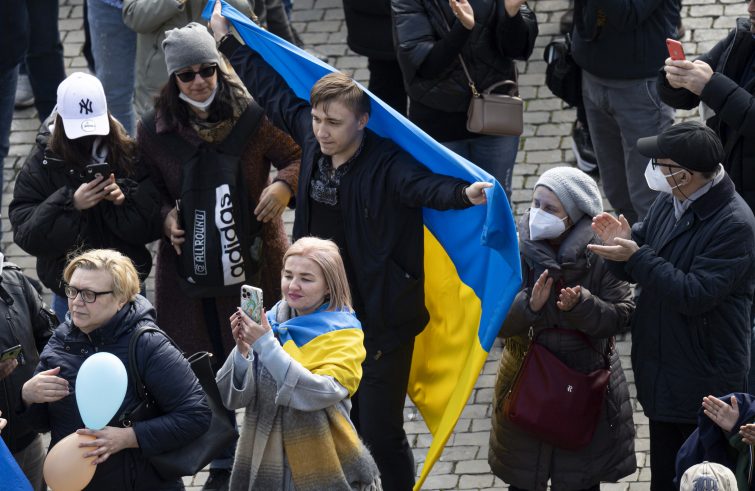
“We carry this people in our hearts” the Pope stated, as he invited everyone to join him at the beginning of Lent on this Day of Prayer and Fasting for Peace in Ukraine, now in its seventh day of war. “Our prayers and fasting will be a plea for peace in Ukraine, remembering that peace in the world always begins with our personal conversion, in the discipleship of Christ,” Francis said greeting the French-speaking faithful, after the catechesis in the Paul VI Hall dedicated to longevity. In his greetings to the English-speaking pilgrims, the Pope also referred to this day , Ash Wednesday: “May the Lenten journey we begin today, with prayer and fasting for peace in Ukraine, bring us to the joy of Easter with hearts purified and renewed by the grace of the Holy Spirit.” Finally, in his greeting to “all Poles”, Francis thanked them with the following words: “You were the first to support Ukraine by opening your borders, your hearts and the doors of your homes to Ukrainians fleeing the war.” “You are generously offering them everything they need to lead a dignified life, despite the current dramatic situation”, Francis said, greeted by a warm and passionate applause from the faithful gathered around him: “I am deeply grateful to you and I bless you with all my heart.” Then, in unscripted remarks, the Pope shared the personal background of the Speaker who introduced the greetings, Fr Marek Viktor Gongalo: “This Franciscan monk is now a speaker in Polish, but he is Ukrainian. His parents are currently hiding in underground shelters, protecting themselves from bombs in a place near Kyiv. He is continuing to serve here with us. In accompanying him, we accompany all the Ukrainian people who are suffering from the bombings. We carry this people in our hearts! And thank you for your work!”.
“The excess of speed, which by now obsesses every stage of our life, makes every experience more superficial and less “nourishing”,
Francis said in the opening lines of the catechesis, noting that “young people are unconscious victims of this split between the time on the clock, that needs to be rushed, and the times of life, that require a proper ‘leavening’.” “A long life enables these long times, and the damages of haste, to be experienced”, the Pope assured: “Old age certainly imposes a slower pace: but they are not merely times of inertia. Indeed, the measure of these rhythms opens up, for all, spaces of meaning of life unknown to the obsession with speed. Losing contact with the slower rhythms of old age closes up these spaces to everyone.” “It is from this perspective that I wished to establish the feast of grandparents, on the last Sunday of July”, said the Holy Father, for whom “the alliance between the two extreme generations of life – children and the elderly – also helps the other two – young people and adults – to bond with each other so as to make everyone’s existence richer in humanity.” “There is a need for dialogue between the generations”, Francis added off-text:
“if there is no dialogue between young people and the elderly, each generation remains isolated.”
Conversely, the modern city “tends to be hostile to the elderly (and, not by chance, also to children). It rejects so many unwanted children and it rejects the elderly, because they are of no use.”
“The excess of speed puts us in a centrifuge that sweeps us away like confetti.”
The Pope remarked: “One completely loses sight of the bigger picture. Each person holds on to his or her own piece, that floats on the currents of the city-market, for which slower pace means losses and speed is money.” “The excess of speed pulverizes life: it does not make it more intense”, Francis noted, calling on the faithful to
“spend time with children and with the elderly,
because they give us another ability to see life.” “The pandemic, in which we are still forced to live, has imposed – very painfully, unfortunately – a halt to the obtuse cult of speed. And in this period, grandparents have acted as a barrier to the affective ‘dehydration’ of the youngest.”
“The meaning of life is not only in adulthood, say, from 25 to 60 years”,
the Pope’s reminder: “The meaning of life is all of it, from birth to death.” “Let us imagine a city in which the co-existence of the different ages forms an integral part of the overall plan of its habitat”, Francis’ dream: “Let us think about the formation of affectionate relations between old age and youth that irradiate out onto the overall style of relations. The overlapping of the generations would become a source of energy for a truly visible and liveable humanism.”
“A reform is needed”, Francis’ final invitation: “The arrogance of the time of the clock must be converted into the beauty of the rhythms of life. This is the reform we must make in our hearts, in the family and in society. The arrogance of the time of the clock must be converted into the beauty of the rhythms of life.”
“The alliance of the generations is indispensable”, the Pope concluded. “A society in which the elderly do not speak with the young, the young do not speak with the elderly, is a sterile society, without a future, a society that does not look to the horizon but rather looks at itself. And it becomes lonely. May God help us to find the right music for this harmonization of the various ages: the little ones, the elderly, adults, everyone together: a beautiful symphony of dialogue.”











